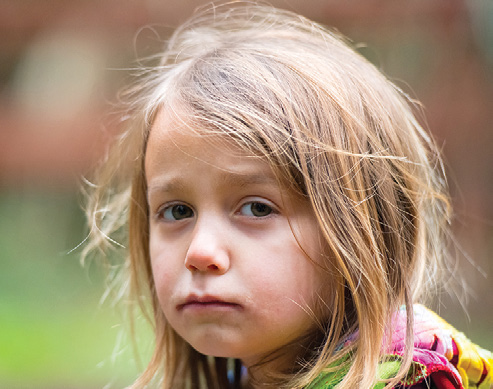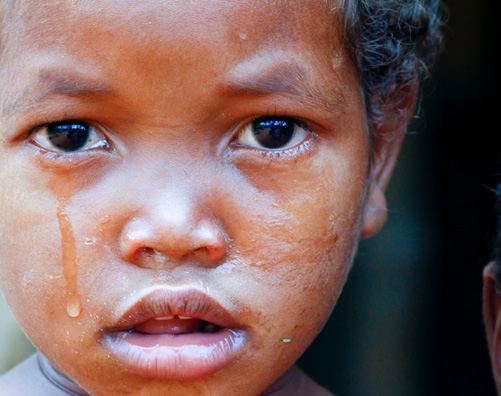Back to series


Questions and Answers From Children About God
Learn more in our Dawn Treader Magazine
 Theodore: Good morning, Susie, how are you doing?
Theodore: Good morning, Susie, how are you doing?
Susie: Do you really want to know, or are you just giving the standard polite greeting?
Theo: Both. Politeness is always important, but it’s only real politeness if it’s backed by genuine concern for the other person. You don’t look happy today.
Su: I’m not. To tell you the truth, Theodore, I’ve been feeling very shaky in my faith lately — I’ve been hearing so much on the news about all the tragedies and disasters going on all over the world, and all my atheist friends keep asking me “If God is so good, why is there so much evil in the world? Why does He allow it?” until I’m almost ready to disbelieve myself. I don’t have any answers for them.
Theo: I know how you feel: that question seems to be the most popular one brought up against the Christian faith lately, and consequently, it’s one of the most important to have some responses for. However, the question of evil is not quite as problematic as it is often made out to be. It makes a lot of sense when you consider how much we influence each other as humans.
Su: What has that got to do with it?
Theo: Everybody can remember someone who has been unkind to them, and a time when they have been unkind to somebody else, for no good reason. And then there’s a ripple effect — people think that because someone else has been unkind to them, they are now entitled to be unkind to everybody else. And the wrongs done by previous generations can also result in consequences to us. These kinds of things just keep building: every huge instance of evil can be traced back to a number of little cruelties and twisted “white” lies and greedy grasping of which any one of us is capable. But when you put it all together and let it grow, it becomes unmanageable and unbelievably horrible. That’s sin, and that’s what is behind all the misery in the world. It’s what sinful people do to each other, to themselves, and even to the natural world.
Su: Yes, I get all this, Theo, but — but why does God allow us to go on acting like this, hurting each other and His Creation? Why didn’t He create the world so that it would be impossible for bad things to ever happen, or for anyone to choose to do wrong?
 Theo: Because God is love (1 John 4:8). If God had created us so that we couldn’t help doing everything just the way He wanted it, we would be mere robots, unable to trust Him or return His love. And God doesn’t want that for us. It’s the fact that we can reject Him, can be sinners and wreck the world, as we have done, that also enables us to return to Him, to love Him in faith, and trust that the final outcome will far outweigh all the evil that we have done and seen done. As C.S. Lewis put it in Mere Christianity, “Of course God knew what would happen if they used their freedom the wrong way: apparently He thought it worth the risk… If God thinks this state of war in the universe a price worth paying… for making a live world in which creatures can do real good or harm and something of real importance can happen… then we may take it it is worth paying.” And remember, He paid all the price of that risk Himself, for our sakes, as it says in Isaiah 53:4-5: “Surely He has borne our griefs and carried our sorrows… He was pierced for our transgressions, He was crushed for our iniquities; upon Him was the chastisement that brought us peace.” We have no right to criticize God for taking a risk for which He bore all the pain, and which offered us the only possible opportunity for love and fellowship with Him.
Theo: Because God is love (1 John 4:8). If God had created us so that we couldn’t help doing everything just the way He wanted it, we would be mere robots, unable to trust Him or return His love. And God doesn’t want that for us. It’s the fact that we can reject Him, can be sinners and wreck the world, as we have done, that also enables us to return to Him, to love Him in faith, and trust that the final outcome will far outweigh all the evil that we have done and seen done. As C.S. Lewis put it in Mere Christianity, “Of course God knew what would happen if they used their freedom the wrong way: apparently He thought it worth the risk… If God thinks this state of war in the universe a price worth paying… for making a live world in which creatures can do real good or harm and something of real importance can happen… then we may take it it is worth paying.” And remember, He paid all the price of that risk Himself, for our sakes, as it says in Isaiah 53:4-5: “Surely He has borne our griefs and carried our sorrows… He was pierced for our transgressions, He was crushed for our iniquities; upon Him was the chastisement that brought us peace.” We have no right to criticize God for taking a risk for which He bore all the pain, and which offered us the only possible opportunity for love and fellowship with Him.
Su: But it certainly seems that human beings still suffer as well.
Theo: When we and others sin, there are consequences that cause suffering, revealing to us that we have been wrong. Hopefully, that will lead us to repent and turn to a new life in Christ.
Su: And what about those who don’t?
Theo: Their rejection of God’s love leaves them in sin and suffering, which is why there is still so much suffering in the world, even after Christ’s sacrifice for us. And Christians often suffer because we still live in a world impacted by the choices of evildoers, as well as by our own mistakes and wrong decisions. But when God destroys all the evil in the world, after everyone has had a chance to choose whether or not to love Him, then there will never be any more suffering.
Su: So, it’s better to live in a world where suffering can happen, because that gives us the opportunity to choose to love?
Theo: It’s not just better; it’s the only world that God could have made that would fulfill His purposes for us.
Ask your children
What do you think about Theo’s answers to Susie’s questions? Do you have any other questions of your own that this dialogue has brought up for you? Challenge them to think up more responses they could give, if someone asked them a question like Susie’s.
Notes:
1 C.S. Lewis, Mere Christianity, 50th Anniversary ed. (London: HarperCollinsPublishers, 2002), p. 48
C.S. Lewis Institute
Author
C.S. Lewis Institute, in the legacy of C.S. Lewis, works to develop wholehearted disciples of Jesus Christ who will articulate, defend, share, and live their faith in personal and public life. Founded in 1976 by Dr. James Houston and James R. Hiskey, the Institute provides leading teachers who address important issues of the day from the perspective of Biblical orthodoxy, while also providing discipleship for individuals in small groups.

 COPYRIGHT: This publication is published by C.S. Lewis Institute; 8001 Braddock Road, Suite 301; Springfield, VA 22151. Portions of the publication may be reproduced for noncommercial, local church or ministry use without prior permission. Electronic copies of the PDF files may be duplicated and transmitted via e-mail for personal and church use. Articles may not be modified without prior written permission of the Institute. For questions, contact the Institute: 703.914.5602 or email us.
COPYRIGHT: This publication is published by C.S. Lewis Institute; 8001 Braddock Road, Suite 301; Springfield, VA 22151. Portions of the publication may be reproduced for noncommercial, local church or ministry use without prior permission. Electronic copies of the PDF files may be duplicated and transmitted via e-mail for personal and church use. Articles may not be modified without prior written permission of the Institute. For questions, contact the Institute: 703.914.5602 or email us.
Speakers

C.S. Lewis Institute
Author
Team Members
C.S. Lewis Institute
Author
C.S. Lewis Institute, in the legacy of C.S. Lewis, works to develop wholehearted disciples of Jesus Christ who will articulate, defend, share, and live their faith in personal and public life. Founded in 1976 by Dr. James Houston and James R. Hiskey, the Institute provides leading teachers who address important issues of the day from the perspective of Biblical orthodoxy, while also providing discipleship for individuals in small groups.


